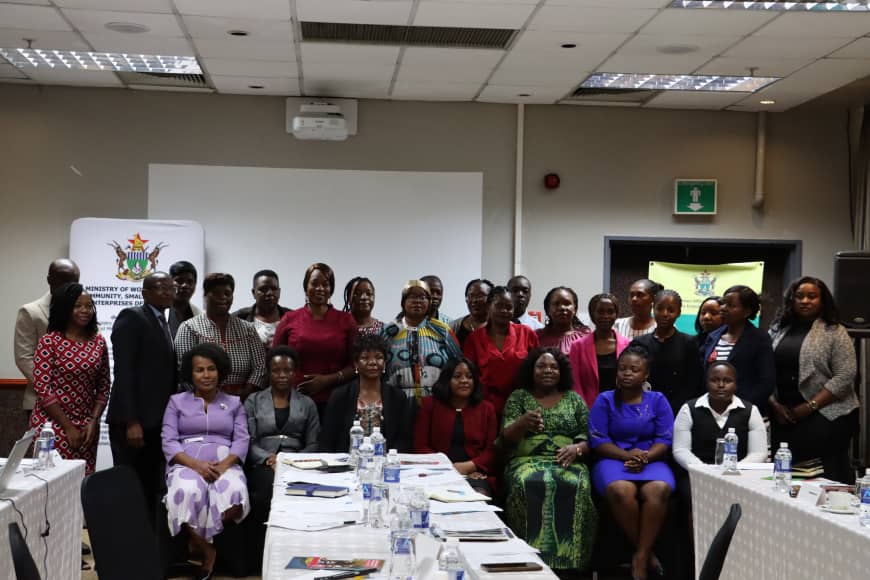|
Getting your Trinity Audio player ready…
|
The Common Market for East and Southern Africa (COMESA) Gender and Social Affairs Division is working on the empowerment of women in the region.
This emerged yesterday at the COMESA workshop on Gender Policy, Implementation, and Gender Planning guidelines held in Harare yesterday with the objective of creating awareness among stakeholders on gender issues guided by the COMESA Gender Policy, COMESA Gender Policy Implementation Plan, COMESA Social Charter and COMESA Gender Planning Guidelines, Checklists, and Indicators.
In her keynote address at the workshop, Chief Director for Gender, Policy Planning, and Programme Management, Mrs. Liliian Matsika Takaendisa, from the Ministry of Women Affairs, Community, Small, and Medium Enterprises Development said these are important instruments that all stakeholders working towards gender equality and women’s empowerment should understand.
“This also provides guidance in terms of gender mainstreaming and women’s empowerment in Zimbabwe. I would like to appreciate COMESA Secretariat for organising this important workshop which will build the capacity of our stakeholders in terms of gender mainstreaming and women empowerment.
“In order to promote gender mainstreaming and gender equality, Zimbabwe has ratified and adopted a number of International and Regional Instruments that promote gender equality and women’s empowerment, amongst them COMESA instruments,” Mrs. Takaindisa said.
She said Zimbabwe is reviewing its gender policy and the Broad-Based Women Economic Empowerment framework which both guide gender mainstreaming and economic empowerment of women.
Beatrice Hamusonde, Director of Gender and Social Affairs at the COMESA Secretariat said the COMESA Gender and Social Affairs Division is responsible to promote gender equality and empowerment of women in the COMESA region.
“This mandate of the Division is drawn from the COMESA Treaty Articles 154 and 155 which recognize gender discrepancies in the Member States which put women in a disadvantaged position to participate in regional trade. To improve the status of women in the region, the Treaty emphasizes that the Member States should take action and revise gender-discriminatory legal frameworks and policies in different sectors including in trade, industry, and agriculture sectors.
Furthermore, the COMESA Treaty underlines the importance of having institutions that facilitate equitable participation of women in the COMESA regional economic integration effort. To this effect, COMESA established a Gender and Social Affairs Division with a mandate of fostering gender equality and empowerment of women in the key COMESA works. The Division, instructed by the Member States, discharges its responsibility by developing the COMESA Gender Policy which was approved (2002 and 2016 respectively) by the COMESA Council of Ministers. The Policy guides the gender work of the Division and member States using gender mainstreaming and empowerment approaches. As it is known, gender is cross-cutting and needs to be addressed in the different COMESA divisions, units, projects, and programs,” Hamusonde said.
She added that to carry out gender mainstreaming in any institution, there are some requirements that need to be taken care of.
“One of the preconditions for gender mainstreaming is ensuring availability of sector-specific gender disaggregated data that produce evidence to revise gender discriminatory laws, policies, institutional setups, practices, societal norms and beliefs that predispose women to low societal status including a vulnerable position in every walk of life when compared to men. In addition, it is necessary, as a planner and practitioner in any sector, to develop gender analytical skills and mindset change towards gender roles and norms to produce gender-sensitive policies, programs, and institutional practices.,” she added.
Zimbabwe is making use of sector-specific gender disaggregated data that gives evidence on gender discriminatory laws, policies, institutional setups, practices, societal norms, and beliefs that predispose women to low societal status and vulnerable positions in every walk of life when compared to men.
In addition, the Ministry of Women’s Affairs as a gender-responsive planner and practitioner for all sectors has developed gender analytical skills and mindset change towards gender roles and norms to produce gender-sensitive policies, programs, and institutional practices.
However, gender imbalances in key sectors remain an acknowledged problem. Women continue to fall behind their male colleagues in terms of their participation in key economic sectors, Public, Private and Political spheres. However, efforts are being made across all sectors to narrow the gender gaps.
Gender equality creates the conditions to boost economic development. Women contribute substantially to the development and should be given the opportunity to participate effectively.
Over 56% of SMEs in Zimbabwe are owned by women ( 2021 Zimstats Survey). However, the majority of female businesses are at the micro level.
“It is therefore important to empower women economically so that they participate meaningfully in wealth creation. Women’s Empowerment is a powerful strategy to attain Gender equality and to also reduce Gender Based Violence. I am glad that today we have representatives from women’s organizations including women in business and I have no doubt that this workshop will improve your capacity in terms of gender mainstreaming and the empowerment of women.
.”It has been proven that women are less susceptible to corruption, more responsible, and utilize whatever resources they have for the benefit of the family as compared to their male counterparts. Finally, having a more gender-balanced workforce may induce more women to become more competitive in nature and pursue decision-making positions,” Mrs. Takaindisa added.
